| Listing 1 - 10 of 18 | << page >> |
Sort by
|
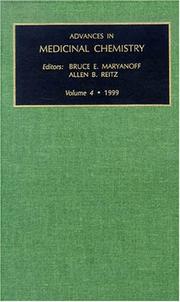
ISBN: 9780080526379 0080526373 1281308684 9781281308689 9786611308681 9780762300648 0762300647 Year: 1999 Publisher: Stamford, Conn. : JAI Press,
Abstract | Keywords | Export | Availability | Bookmark
 Loading...
Loading...Choose an application
- Reference Manager
- EndNote
- RefWorks (Direct export to RefWorks)
Volume 4 of Advances in Medicinal Chemistry is comprised of six chapters on a wide range of topics in medicinal chemistry, including molecular modeling, structure-based drug design, organic synthesis, peptide conformational analysis, biological assessment, structure-activity correlation, and lead optimization. Chapter 1 presents an account about amino acid-based peptide mimetics corresponding to b-turn, loop, helical motifs in proteins as a probe of ligand-receptor and ligand-enzyme molecular interactions. Chapter 2 addresses new facets of the medicinal chemistry of the important antica
Multi
ISBN: 9780128035573 0128035579 0128035196 9780128035191 9780128035191 Year: 2015 Publisher: Amsterdam, [Netherlands] : Academic Press,
Abstract | Keywords | Export | Availability | Bookmark
 Loading...
Loading...Choose an application
- Reference Manager
- EndNote
- RefWorks (Direct export to RefWorks)
Prodrug Design: Perspectives, Approaches and Applications in Medicinal Chemistry provides a focused overview of this critical area of drug discovery, as that continuous process strives not only to discover new drug compounds but also to modify the existing ones. This valuable primer supports this mission of drug development and its goal of reducing undesired effects and improving therapeutic effectiveness of drug compounds. Providing a unique compilation of data, insightful case studies, and review of existing literature in the area, the book will promote innovation in medicinal and pharmaceu
Pharmaceutical chemistry. --- Drugs --- Design.
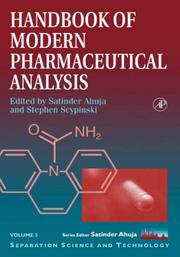
ISBN: 9780080488929 0080488927 1281053147 9781281053145 9786611053147 9780120455553 0120455552 Year: 2001 Publisher: San Diego, CA : Academic Press,
Abstract | Keywords | Export | Availability | Bookmark
 Loading...
Loading...Choose an application
- Reference Manager
- EndNote
- RefWorks (Direct export to RefWorks)
This book describes the role modern pharmaceutical analysis plays in the development of new drugs. Detailed information is provided as to how the quality of drug products is assured from the point of discovery until the patient uses the drug. Coverage includes state-of-the-art topics such as analytics for combinatorial chemistry and high-throughput screening, formulation development, stability studies, international regulatory aspects and documentation, and future technologies that are likely to impact the field.
Pharmaceutical chemistry --- Drugs --- Analysis
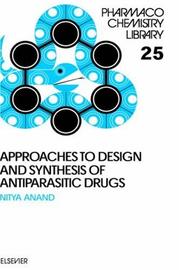
ISBN: 9780444894762 0444894764 9780080527529 0080527523 1281047643 9781281047649 9786611047641 Year: 1997 Publisher: New York Elsevier
Abstract | Keywords | Export | Availability | Bookmark
 Loading...
Loading...Choose an application
- Reference Manager
- EndNote
- RefWorks (Direct export to RefWorks)
This book presents a comprehensive and up to date account of the chemotherapy of parasitic diseases, both human and veterinary. The book starts with an overview of parasitic diseases. The body of the book is divided into two parts: antihelminthic drugs, and antiprotozoal drugs. Both parts start with chapters highlighting the 'biochemical targets' available for chemotherapeutic interference. Individual chapters deal with one chemical class of compounds and describe their origin, structure-activity relationship, mode of action, and methods of synthesis and their status both in clinical and veter
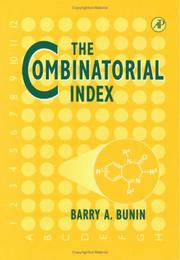
ISBN: 9780121413408 0121413403 9780080542409 0080542409 1281025860 9781281025869 9786611025861 6611025863 Year: 1998 Publisher: San Diego Academic Press
Abstract | Keywords | Export | Availability | Bookmark
 Loading...
Loading...Choose an application
- Reference Manager
- EndNote
- RefWorks (Direct export to RefWorks)
With the explosion of combinatorial solid-phase methods, access to information has become one of the main barriers facing a synthetic chemist who is contemplating a combinatorial approach to a medicinal chemistry problem. The Combinatorial Index is an answer to that problem. This compendium of methods from the primary literature provides quick and convenient access to reliable synthetic transformations as well as information on linkers and analytical methods. Each synthetic procedure is preceded by a section entitled"Points of Interest, "which highlights the strengths and weaknesses of the various studies. The index also covers the use of solution-based synthesis for the generation of molecular diversity. Key Features * Organized for rapid retrieval of published information on classes of synthetic transformations, linkers, and analytical methods * Serves as a laboratory manual for bench chemists * Includes a chapter on linkers to assist in choice of linking strategy * Discusses strengths and limitations of the various methods * Contains a structural index showing functional group transformations in solid-phase synthesis.
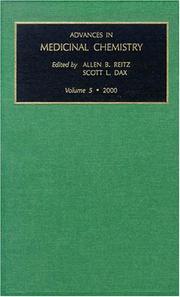
ISBN: 1281019445 9781281019448 9780080526775 0080526772 9786611019440 9780762305933 0762305932 Year: 2000 Publisher: Greenwich, CT : JAI Press,
Abstract | Keywords | Export | Availability | Bookmark
 Loading...
Loading...Choose an application
- Reference Manager
- EndNote
- RefWorks (Direct export to RefWorks)
Volume 5 of Advances in Medicinal Chemistry contains four intriguing and detailed accounts of the close interface between synthetic chemistry, structure-activity relationships, biochemistry, and pharmacology. In Chapter 1, there is a comprehensive survey of the immunophilin area specifically focussing on neuroregenerative applications in the central nervous system. In Chapter 2, there is an overview of the development of a potent analgesic compound that works via modulation of neuronal nicotinic acetylcholine receptors.
Multi
ISBN: 9780128145289 0128145285 0128145277 9780128145272 Year: 2020 Publisher: Amsterdam, Netherlands : Elsevier,
Abstract | Keywords | Export | Availability | Bookmark
 Loading...
Loading...Choose an application
- Reference Manager
- EndNote
- RefWorks (Direct export to RefWorks)
Dendrimers. --- Pharmaceutical chemistry. --- Dendrimers --- Nanomedicine
Multi
ISBN: 9780128007907 0128007907 9780124202467 0124202462 Year: 2015 Publisher: London, England : Academic Press,
Abstract | Keywords | Export | Availability | Bookmark
 Loading...
Loading...Choose an application
- Reference Manager
- EndNote
- RefWorks (Direct export to RefWorks)
The pharmaceutical industry is currently operating under a business model that is not sustainable for the future. Given the high costs associated with drug development, there is a vital need to reform this process in order to provide safe and effective drugs while still securing a profit. Re-Engineering Clinical Trials evaluates the trends and challenges associated with the current drug development process and presents solutions that integrate the use of modern communication technologies, innovations and novel enrichment designs. This book focuses on the need to simplify drug development and
Pharmacology. Therapy --- Human medicine --- Pharmaceutical chemistry.
Multi
ISBN: 9789819953141 9789819953134 9789819953158 9789819953165 Year: 2024 Publisher: Singapore : Springer,
Abstract | Keywords | Export | Availability | Bookmark
 Loading...
Loading...Choose an application
- Reference Manager
- EndNote
- RefWorks (Direct export to RefWorks)
Pharmacology. Therapy --- farmacologie --- Pharmaceutical chemistry. --- Nanomedicine.
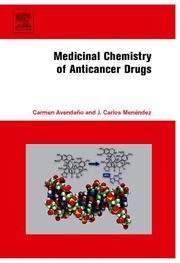
ISBN: 9780444528247 0444528245 9780080570327 0080570321 9780080559629 008055962X 9786611279608 6611279601 9780444626677 0444626670 Year: 2008 Publisher: Amsterdam : Elsevier,
Abstract | Keywords | Export | Availability | Bookmark
 Loading...
Loading...Choose an application
- Reference Manager
- EndNote
- RefWorks (Direct export to RefWorks)
Antitumor chemotherapy is nowadays a very active field of research, and a huge amount of information on the topic is generated every year. Although many books are available that deal with clinical aspects of cancer chemotherapy, this book addresses the need for an updated treatment from the point of view of medicinal chemistry and drug design. The focus of Medicinal Chemistry of Anticancer Drugs is on the mechanism of action of antitumor drugs from the molecular point of view and on the relationship between chemical structure and chemical and biochemical reactivity of antitumor agents,
Oncology. Neoplasms --- Antineoplastic Agents --- Neoplasms --- Cancer --- Drugs --- Pharmaceutical chemistry --- Médicaments --- Chimie pharmaceutique --- chemistry. --- pharmacology. --- drug therapy. --- Chemotherapy --- Design --- Chimiothérapie --- Conception --- Pharmaceutical chemistry. --- Chemotherapy. --- Design.
| Listing 1 - 10 of 18 | << page >> |
Sort by
|

 Search
Search Feedback
Feedback About UniCat
About UniCat  Help
Help News
News